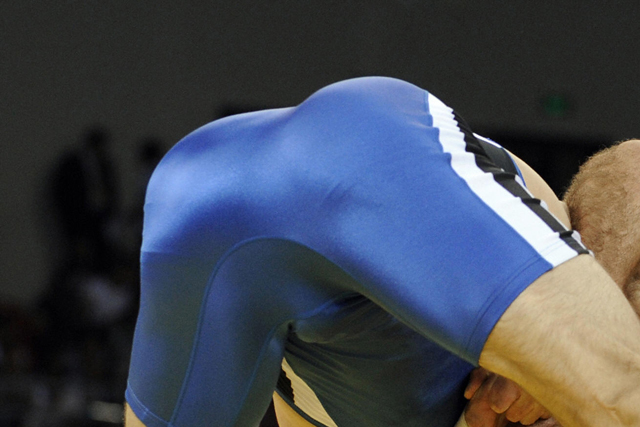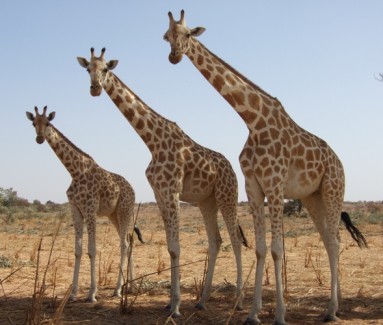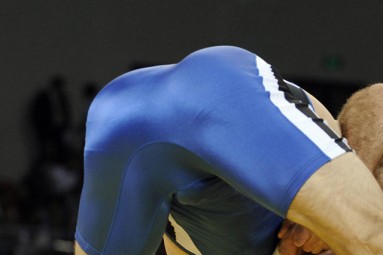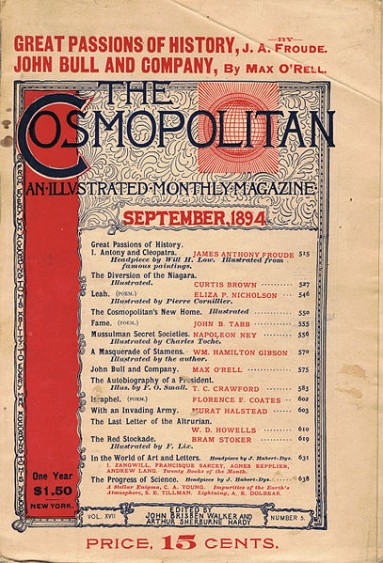What's going on in beauty this week, from head to toe and everything in between.From Head...
"Tricky tricky things": Stunning short fiction from Nigerian sci-fi writer Nnedi Okorafor about—see, if I say it's about a magical wig it'll sound far less nuanced and enchanting than it actually is. So instead, let's say it's about the power of looking instead of being looked at. (Thanks to Ben Laden for the heads-up!)
...To Toe...
Zootopia: Reasons not to be a giraffe, part I: You'd have to be anesthetized before your pedicure.
...And Everything In Between:
Tease and desist: Urban Decay, maker of a "Naked" palette line, sends a cease-and-desist letter to Victoria's Secret about their new cosmetics line "The Naked." Vicki's Secret responds by filing a suit in federal court asking for the right to get nekkid, and the legal world now waits with bated breath to find out who will emerge victorious in the battle of the nudes.
Decisions, decisions: Estee Lauder heir Ron Lauder, quarter-owner of ailing Israeli TV station Channel 10, faced with deciding whether to pump roughly $15 million into keeping the channel afloat or letting it die its natural death.
Goliath: Interesting Wall Street Journal piece about how mid-sized beauty brands get snatched up by beauty behemoths—think the Coty buyout of Philosophy, or Estee Lauder and Smashbox. The anti-corporate gal in me has a negative knee-jerk reaction to this, but a beauty editor revealed a different angle in our interview: "A lot of times it’s better because now you have this huge R&D machine to work with. Clorox bought Burt’s Bees, and when I went to the Burt’s Bees factory and asked about it, they were like, 'It’s the greatest thing ever—they let us continue doing what we were doing, but we have an infusion of cash so we can do more.'"
Mom & Pop: Local brands in China are giving pause to dominant forces like Proctor & Gamble. This piece is more about personal care and home products in general, but I wonder about its implications for the beauty market. Beauty brands have poured a good deal of resources into developing products to target Asian consumers—could it be for naught, if domestic brands are no longer considered second-rate by the buying public?
Good girl gone: "Family brand" Nivea drops association with Rihanna, whose "California King Bed" was the soundtrack to a recent commercial, saying that her sexy persona wasn't compatible with the company's wholesome image. You'd have thought they'd consider that before picking her song for the commercial in the first place, but what do I know about showbiz?
I go nuts for gymnast butts: What if photo editors treated male athletes the way they do female volleyball players? Class-A satire of objectification.
XX-ray spex: Blinders that blur men's eyesight so they can't see women beyond a narrow range of vision? An Orthodox organization has developed these "anti-ogle goggles," and while my instinct was to be pleased that for once the onus of "modesty" was being placed on the person doing the looking as opposed to the person being looked at, at day's end I'm with Hugo, who points out that a "covenant is a promise sustained by faith, not by a crude device that impairs the senses."
The case of Lolo Jones: The New York Times says Olympic hurdler Lolo Jones really only gets attention because she's pretty, which seems maybe like a sensible assertion to make until you read the article, which has a nasty tone and implies it's somehow Jones's fault that her more heavily-medaled teammates aren't getting the attention thrust upon her. As ever, Caitlin Constantine's take on this is razor-sharp: "It’s absolutely valid to ask why Jones, who did not medal in Beijing, is considered so much more marketable than Dawn Harper, who actually won the gold medal. ...That’s not what I’ve really seen a lot of people talk about. Instead, it seems like Jones’ greatest sin in the eyes of many is that she is a self-promoter." The way Olympic endorsements work isn't fair, that's for sure, nor is it standardized. By all rights, a medalist like Dawn Harper should be reaping endorsements and attention. But as Jezebel points out, "While Jones has certainly garnered her fair share of attention for, yes, her good looks and sexual choices, questioning her qualifications to be in the Olympics should have ended when she, y'know, qualified for the Olympics."
Rue the day: According to Research, which we know is never infallible, men tend to regret not pursuing physically attractive women, while women tend to regret not following up with wealthy men. I'm not quite sure what to make of this—I mean, sure, I theoretically regret not having milked my Greek shipping magnate-suitor for private dinners at French Laundry, but in actuality, I can't think of true romantic regrets of this variety. (Maybe I'm just easy?) Is this something people really go through? Do you regret not pursuing particular people? If so, was your reasoning about their looks, their income...?
Model citizens: Positively drooling to see this HBO documentary about aging models, with notable names such as Jerry Hall, Isabella Rossellini, and Paulina Porizkova. Only with age can someone like Porizkova reflect on her early career: "Working off your looks makes you pretty much the opposite of self-confident. Still, I don’t think any 15-year-old girl will turn down the chance to be called beautiful. You don’t realize at that point that you are also going to be called ugly.” Or, sadly, "What people called sexual harassment, we called compliments. When a 16-year-old is flattered by a man pulling out his penis in front of her, that’s noteworthy.”
To the point: "People who care a lot about their own beauty usually have strong and complicated reasons for feeling that way." I've had a couple of drive-by commenters say that they think my entire blog is a testament to how gorgeous I think I am, and each time I'm left wondering how anyone could get that from what I write. (Apparently a woman writing about looks without taking care to be self-deprecating is tantamount to extravagant pride?) From now on, I might well refer them to this mini-treatise on the fascination of our own looks. (Thanks to Tizz Wall for the link.)
The upside of ugly: Challenging piece from Jessica Valenti about the self-esteem trap we set up for girls by telling them "confidence" is all they need to make it in the world, with the hook of plastic surgery given to kids who have "facial deformities"...like ears that stick out. There's much I disagree with here (Valenti attributes her sense of humor and feminism to not having grown up a terribly pretty girl, which seems an odd construction for a feminist to make; what of all the pretty girls who found feminism because they got tired of being valued for their looks?) but the core here is intact: If we turn self-esteem into the end-all, be-all of girlhood, we set up a parallel path in which any route girls take to get there—including plastic surgery—is justified.
Source of all my sex tips.
Cosmo girls: My lifelong love-hate relationship with ladymags gets even more complex with reading this New York Times magazine article by Edith Zimmerman about international editions of Cosmopolitan (64 of 'em!).
Nailing it: Tracie Egan Morrissey looks at nail art, "the last bastion of female-centric beauty." As she points out, nails are the one beauty ritual that has naught to do with fitting some sort of beauty standard that evo-psych enthusiasts claim is about women babooning for men, thus totally legitimizing the fact that my toenails haven't gone a day unpainted since 2006.
Popularity contest: Fashionista looks at the beauty products that showed the greatest sales increase in the first two quarters of the year. Most surprising: Makeup palette sales shot up 19%. Why so popular all of a sudden? I'm guessing some combination of feeling like you're getting more for your money, and the way it sort of scratches the itch for curation, which has become quite the thing thanks to ye olde internet. It's a Twitter feed for your face!
Disability visibility: An intriguing trio of academic papers focusing on appearance and disability: prosthetics as accessories; acceptance and rejection of the beauty status quo among blind women; and garments designed to prevent inappropriate undressing among dementia patients.
Can't buy happiness: This sorta grody infographic that tried to half-assedly argue that spending money on beauty makes people unhappy made the rounds this week. The most interesting take is at Autostraddle, where Gabrielle mused about the role of the queer community and mainstream beauty culture: "The study claims that beautiful people make more money than not beautiful people, but last time I checked, dykes still make less than cis-men." The larger point here is that we're in a lose-lose proposition: People who are "naturally" beautiful enjoy greater happiness, but spending more money to appear naturally beautiful doesn't appear to have an effect on happiness.
In the rough: The world's most expensive nail polish: the $250,000 black diamond nail polish by jeweler Azature. (Looks like sandpaper to me. Am I alone?)
In the buff: Every so often there's a brand or product too great not to share: Meet MySkins, a bra/underwear line with 20 different shades of "nude." Still lacking on the darker end of the skin-tone spectrum, but it's still nice to see a start of a solution to a problem that prevents some of us from wearing white tops with pride.
Ladyscope: I love it when someone fesses up to doing something I do covertly, which is why I totally ate up this Kate Fridkis essay on checking out other women. So often this gets talked about strictly in terms of competition, but that's only rarely what my own secret scoping is about. (If anything, it's awe, but that doesn't fit as nicely into the ladies-love-to-catfight narrative, now, does it?)
On being Californian: "Latina women stop you in the street to ask what shampoo you use; 'Your hair is like mine,' they reach out to touch it, awed by the familiarity. They ask whether you are one of them–this time you don’t mind. They are mournful when you answer, 'No.' 'You’re pretty!' they exclaim. Please be possible, had been the unspoken hope. I can’t look white but I can look like you! I know, because I see the reflection of my desires on their faces."
Just like us: Introducing the eminently likeable celebrity as Every Girl, courtesy Courtney at Those Graces. I've read waaaay more than my share of celebrity profiles (for work, most of the time) and was snookered in by this trope at first—Wow, Jennifer Aniston sounds so normal! She's goofy and down-to-earth and wears pajama pants around the house! Jennifer Aniston—she's just like us! And then I noticed the same sentiment being applied to Courtney Cox, and Kate Hudson, and Claire Danes, and Reese Witherspoon, and so on until I had to conclude that the whole thing was a ploy. A casual observation, thoroughly not researched: Every so often celebrity profile writers will break this trope by being all, "Now THIS woman is a real STAR and she's so GLAMOROUS and UNTOUCHABLE." And off the top of my head, every time I've seen this done, it's a non-white celebrity. (Jennifer Lopez, Jennifer Hudson, and Beyoncé come to mind.) Do we want our black starlets to be unapproachable divas?



